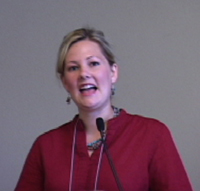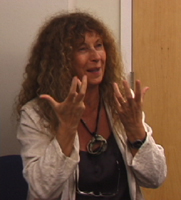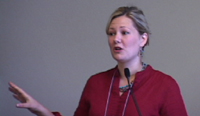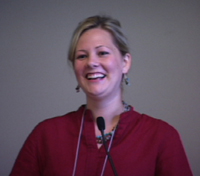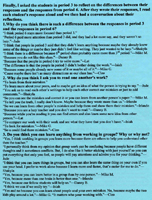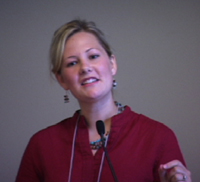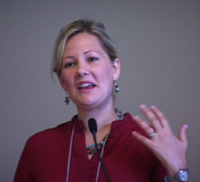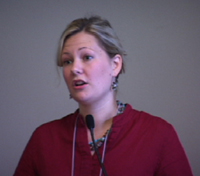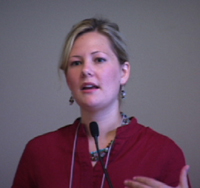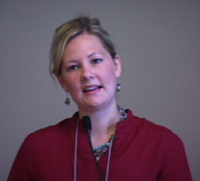I want to tell you the story of my journey to understand what documentation really meant for me and my students. I teach 9th grade English Language Arts in a Boston public high school, and I joined MLV a year and a half ago. At that time, I had never heard of Reggio Emilia. So, when the term documentation of student learning came up, I had no idea what anyone was talking about. As an English high school teacher, I really wasn't sure how the Reggio work was going to translate into my setting in a public high school. My students are 14 or 15 years old, we do a lot of reading and writing, and I see 100 kids a day. So I was struggling with how to make that transition. When I was first exposed to a lot of these ideas there seemed to be a focus, to me, on beautiful pictures and really pretty posters. So I said to myself, I can do that, I can make a really pretty poster.
Documentation Examples > Examples of documentation shared back with learners
Listening: The Heart of What Documentation Really Is
School: Monument High School
1. Transcript of Presentation
When it came time to bring in our first piece of documentation to the Making Learning Visible Seminar, I brought a poster that I had made that had pictures of my students performing Romeo and Juliet, and I displayed it. On that day Vea Vecci, a veteran atelierista, from Reggio Emilia happened to be there.
She opened up the discussion by saying, "That's really interesting, but I don't think that's documentation." I was a little taken aback, but she went on to explain herself. She said, "I wouldn't call it documentation because it doesn't tell me what your students are thinking. And documentation should show, even to an outsider who knows nothing about you or your students or your school, something about what your students understood."
That moment was a real shift in my thinking about what documentation was.
The first time I felt that documentation was useful to me was in the early fall when we were working in Writers' Workshop on memoirs. After students had written their first drafts, they formed peer-writing groups and I asked them three reflection questions: What did you learn from the teacher? What did you learn from another person's comments today? And what did you learn from another person's writing today? Two of my classes did very well with this activity. They were able to form productive small groups and they were able to engage in interesting conversations.
However, one of my classes did not go well at all. I want to share a couple of their responses to those questions. What did you learn from the teacher? I learned nothing from the teacher today. I learned how to look for mistakes. What did you learn from another person's comments about your writing today? I didn't learn anything from my peers. I learned nothing from other people's help. What did you learn from another person's writing? [I learned] that they have no life. I didn't really learn anything. There were a few sprinklings of positive comments about lessons learned, but the overwhelming majority of students said that they had learned little, if anything at all. At the end of the day I was looking through all of my classes' comments wondering why this group was responding so negatively when all of my other classes had had a really positive experience with this.
So the next day I decided to share their documentation with them and ask them what their thoughts were. I told them that I thought yesterday did not go well at all. I said, "I noticed that all of your responses were really different from all of my other classes' responses and in particular my period 6 class. I'm going to read you what you wrote, and then I'm going to read you what period 6 wrote. Then I'm going to ask you some questions about that." At that point they were completely riveted, and this was a class that was never riveted. They were really engaged, I mean, you could hear a pin drop. They were really into this.
After I had read both sets of responses, I asked, "Why do you think there is such a difference between your responses and period 6's responses?" Jade said, "Period 6 paid more attention than Period 3 did. They had a lot more to say, and they weren't so lazy." Tequila said, "Period 3 said they didn't learn anything because maybe they just already knew some of the things, or maybe they just didn't feel like writing. They just wanted to be lazy." And Danny said, "Because you do not like this class."
Then I asked them, "Why do you think I asked you to read one another's work?" One student said, "To learn from their mistakes." Jade said, "To learn from your peers and maybe get an idea of what the person is trying to say." Another said, "Because when you're reading it, you can see errors and also learn some new ideas from others." And Isaiah said, "To compare our work with their work and see what they have and what you don't have."
The last question I asked them was, "Do you think that you can learn anything from working in groups, why or why not?" Wilson said, "Yes, because there are others to help you understand other than the teacher." Orlando said, "Yes, because more than one brain is better than just one brain." Michael said, "I think we can if we really try." Another Michael said, "Yes and no. Yes, because you learn about people and your own mistakes. No, because maybe the kids play around a lot." And one student said, "I think you can learn things in groups, but you can also learn the same thing on your own if you use your head. I prefer to work alone because I learn more and faster, and that's easier for me to do."
That led to another conversation where I wondered, "A lot of you said we were really lazy in here. Do you want to change that?" And it was kind of a full discussion and a lot of them said, "Yes, we can change just a little bit." One student said, "I don't want to change the talking part, but maybe the lazy part." After we had had this conversation, there was a real shift in this class. There had been a really negative dynamic in the group, but these students started to cooperate more. There was just a real shift in their identity, which was really powerful. I realized that using the students' words as text, and using that documentation helped me to see how I could help change the group identity.
So, here are just a couple of concluding thoughts. The documentation I did came out of a direct need concerning my students. It felt like a natural part of my teaching, rather than something extra I had to do or create or make on top of what I was already doing. I also realized how documenting children's learning helped to make learning visible and shape the learning that takes place. I started to see how that could actually work in my classroom. Finally, one last anecdote: This all happened last year, and at the end of the year, one girl from my period 3 class came up to me and said, "You're the only teacher I've ever had that listened to us when we have suggestions for the class." I don't say that to congratulate myself at all, only that I think that comment is a direct result of the documentation that I've been trying to implement in my classroom. It relates to the heart of what documentation really is.

